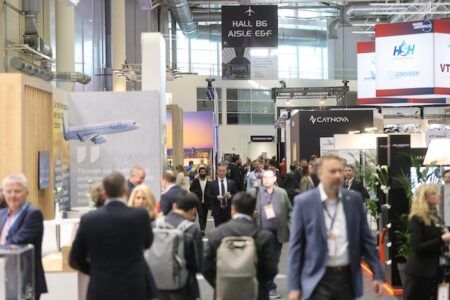Bigger and bigger
In CEO Rainer von Borstel’s own words, the last half-decade has seen Diehl Aerosystems grow “very, very fast.”
In 2006, Diehl Aerosystems was formed as a corporate division under parent company Diehl Stiftung & Co. As part of this special division, Diehl Aerospace became the primary business unit, developing avionics systems and lighting concepts for civil and military aircraft.
Not long after that, a snowball effect began.
In 2008 a second business unit was formed when Diehl, in a majority share partnership with Thales, acquired a former Airbus production site in Laupheim, Germany. This site became the home of Diehl Aircabin, competing in the production of cabin modules, crew rest compartments and air ducting. A few years later, in 2012, Diehl agreed to take over Thales’ shares in Diehl Aircabin, making it a wholly-owned subsidiary.
Diehl Comfort Modules (DCM) was the third business unit to be incorporated under Diehl Aerosystems. This came about through the 2010 acquisition of Dasell Cabin Interior, which added to Diehl’s core competencies a significant new understanding in the area of aircraft lavatories. Then Mühlenberg, a leading German manufacturer of weight-optimized cabin interior sections, became part of the family in 2011. Mühlenberg was re-branded as Diehl Service Modules (DSM) the following year.
According to von Borstel, the fifth and final piece of the puzzle, a supplier of advanced cabin air and water systems, is now in place. “Six months ago we integrated our newest ‘baby’ if you will, and that is Appareatebau Gauting GmbH (AOA). AOA had belonged to one shareholder of our company already on a private basis. Now it has been integrated into the official company structure, so it’s part of Diehl Group.”
Phase two
Diehl Aerosystems has increased turnover to one billion euros annually (up from about 200 million euros a half-dozen years ago) and projects future growth to keep pace with the industry at around 5% per annum. The company has likewise increased its workforce five-fold and opened a number of new strategic locations, but the truly manic growth that defined the last several years is now largely behind it.
Today, as the firm’s physical expansion levels off, Diehl is implementing a strategy to progressively optimize its enormous international structure and diverse internal processes.
“We have just finished phase one of our corporate division development, because the last six years have been dominated by growth and finishing new aircraft programs. Now we are going to the next phase, which is being driven by serial ramp-ups for Airbus, for Boeing, for Embraer, for Bombardier,” von Borstel reveals. “We are looking to either work better inside of the units, or even merge some units to find synergies and better integrate product.”
SMILE 2020, as the improvement program is called internally, has been accelerated in the last year. It sets out to assess and streamline operations and to accelerate innovation across the Division’s entire organizational network.
Already this new approach of lateral thinking and enhanced cooperation has yielded some success. “We had the idea to integrate lighting components [a faculty of Diehl Aerospace] into air ducting [provided by the Diehl Aircabin business unit]. This isn’t something you would normally think of because the air ducting is embedded far deeper into the cabin than light systems, but this saves weight, which is very interesting for the airlines,” says von Borstel.
Getting it together
Between now and the end of 2016, Diehl’s operations in Hamburg, Germany (home to a A380 cabin completion and paint shop, A350 XWB forward and rear fuselage production, and final assembly lines for A318s, A319s, A320s and A321s) will see some of the most significant changes under the SMILE 2020 consolidation initiative.
Above: Engineers at Diehl’s Hamburg facility installing sidewall panels on an A380
“In Hamburg today our activities are spread across a number sites all over the Metropolitan region,” explains David Voskuhl, Diehl Aerosystems’ VP of communications. “We are working on a consolidation of these sites. In the future, we want to focus everything in just three places.”
Currently, Diehl Comfort Modules and Diehl Service Modules are both based in Hamburg, though their sites are on opposite sides of the Elbe River and the city’s entire downtown area lies between them. Diehl Service Modules is spread over several locations around the north of the city, while Diehl Comfort Modules enjoys an advantageous address directly next door to Airbus Finkenwerder on the south side of the river.
When construction of a new facility is completed near the end of 2015, Service Modules will join Comfort Modules on the South side of the Elbe in an area called ‘Genter Ufer’ (circled in the image below). A main driver for the selection of this site (aside from its 10,000 square meter area for production and logistics) was its close proximity to both the A7 motorway and to Airbus.
In addition to moving DSM closer to DCM geographically, Diehl intends to apply organizational changes aimed at bringing the units and their complementary product lines closer together. Operating with a stronger corporate bond, it is expected that the business units will be able collaborate, innovate and share resources much more efficiently.
“We launched SMILE 2020 in order to optimize Diehl Aerosystems, which grew into a conglomerate of five units within a few years,” says Voskuhl. “After the phase of growth by acquisition… we needed to enhance our corporate structure, our processes and way of working – both internally and with our external stake holders. Concentrating our Hamburg activities in three places, and using the new facility at Genter Ufer for this, will help us become more efficient and therefore stronger.”
A third Diehl location in Hamburg, also not far from Airbus, is home to administrative offices.




